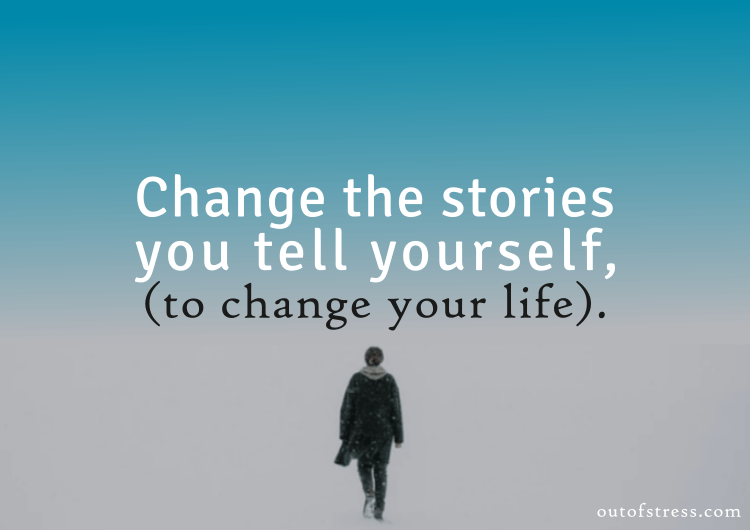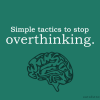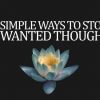
Over ten years ago I was helping someone move and as I carried moving boxes up the stairs, a loved one sauntered up the steps behind me and uttered these words to me, “Your butt is the beginning of the end.”
So in other words, she was telling me that because I had recently gained some weight my rear end was on its way to the gluteus graveyard!
Thankfully, I was wise enough not to believe the story she was telling me about my body, but the words still hurt.
Compassion helped me to know that this woman must have stories she tells herself about her body in order for her to try to wound me in the way she did.
I could have decided to attach myself to this story and chosen to get stuck in a pattern of negative thinking about my body, but instead I chose to celebrate my curves. I continue to be intentional to love my body no matter the size of jeans I am wearing.
Also read: 54 powerful quotes by Rev. Ike on Wealth, Self Belief and God.
Here’s how you create stories about yourself
There are endless ways we create stories about ourselves.
Maybe you grew up in a house where your sibling made straight A’s and so you viewed them as the smart kid and you have internalized this story and decided you are the dumb one.
I grew up with brothers who were quite athletic and played multiple sports. As a child I played many sports too, but whether I was playing recreational basketball or dancing in ballet class, I always felt clumsier than my friends and I also recognized physical pursuits did not come as naturally to me as they did for my brothers.
So around the age of 14, I began to buy into the story that I was not athletic. This was a dangerous narrative because after being connected to my body for many years through running, swimming and many other sports, I started to disconnect from my body and I spent less time moving in it.
And so for years, I believed the story that I was not athletic and this storyline kept me from living in my body and taking care of it. Thankfully, after college I started to slowly get back into physical activity. When I eventually found yoga, this practice really helped me to live in a more embodied way.
Also Read: 18 Deep Self Love Quotes That Will Change Your Life.
You create stories that limit you
The stories we tell ourselves come from the values of many generations of our family, our experiences, the culture we live in and the stories others tell us.
For example, a gifted dancer has a dad who tells her regularly that she will have to graduate college in order to be successful, and so even though she doesn’t want to go to college, she buys into her dad’s pressure to go and ends up being miserable. But in her second year of college this dancer starts to realize she is no longer attached to the story that you have to go to college in order to be successful, and so she drops out of school and finds liberation by following the impulse she has to pursue dance.
We create stories that suggest we are not enough and we do this because we are hardwired for certainty.
Dr. Brené Brown says, “When we give the brain the story, we are given the chemical reaction as a reward. The brain rewards us for the story, regardless of its accuracy.”
And because the brain does not like mystery, we constantly make up false stories about ourselves and others, because this temporarily makes us feel better about ourselves.
Sometimes the negative stories we make-up about ourselves end up becoming eerily similar to the stories we create about others. We are not consciously aware that we are distorting the truth about ourselves and others, but most of us confabulate stories on a daily basis. When we demean others in this way we become separated from our true selves and from one another.
We create our world through stories. Unfortunately, we like to fit ourselves and others in stories in order to make more sense of the world. Just as we generate untrue stories about ourselves, we also create stories about others that are not always true.
We try to put people in boxes by calling them a narcissist, perfectionist, drama queen, snob, control freak and so many other names. We point the finger at others easily because we are great at undermining ourselves. But it is much easier to honor ourselves and others if we are not creating these narratives.
As a psychotherapist, I often hear people articulate undesirable stories about themselves. They tell me, “I’m not a good teacher, I’m an angry person, I have a dysfunctional family, I can’t dance…”
The stories my clients tell themselves might be rooted in some life experiences and yet my clients empower these stories everyday as they keep them alive. All of us have growing edges and ways we can strive to improve, but we still need to be careful to not get stuck in a negative story.
Also Read: Using affirmations to let go of negative beliefs.
An example of a limiting story I held about myself
I recently attended a yoga workshop and our teacher invited us to color a mandala. A mandala is an ancient spiritual practice of coloring a geometric shape.
Michal Beaucaire is the author of ‘The Art of Mandala Meditation’ and he argues there is compelling research that the mandala is similar to meditation in the way it calms the mind and allows us to move into Alpha waves and experience new levels of consciousness.
When our leader shared we were going to do this practice my immediate inner reaction was that I didn’t want to do the mandala ritual. This was probably because I am a doer and I often resist the sacred gift of stilling my mind. But another part of my response to participating in the mandala was rooted in a longstanding belief that I am not an artist.
This is an insecurity and story I have had for many years. I’ve always liked to do things I have perceived I am good at and because of my limiting beliefs about my creative abilities; I have often resisted embracing my artistic side.
Our workshop leader invited us to embrace our inner child and draw. Despite my reservations, I picked out my mandala and because I was one of the last in line to pick out the colored pencils, there were only a few colors left and so I ended up with blue, red and orange pencils.
I was disappointed that orange was one of the colors I was using, because I have never liked this color. But as I colored my mandala in patterns of orange, red and blue I became quite proud of my art work, and I found this creative and calming activity was actually a rich experience.
This exercise also helped me to process why I had such a negative association with the color orange. As I colored, I remembered how painful it was to deal with my dad’s alcoholism as a child, but it was particularly hard on days when the University of Tennessee played football. Tennessee’s colors are orange and white. If Tennessee lost the football game my dad’s temperament was colored by this defeat and his bad mood pervaded our home.
I also had a negative connotation with the color orange because my dad hit rock bottom with his drinking when we lived in Tennessee. He later went on to recover from his drinking problems, but as a young person his issues profoundly embarrassed me. So the color orange represented my shame.
As I worked on the mandala, the color orange now seemed to find some redemption and the color that I had hated now seemed beautiful. I realized the mandala was helping me release another layer of my shame. This practice also helped me reexamine my feelings about the color orange. I thought of the title of Netflix’s popular show, Orange is the New Black, and realized orange had certainly become the new it color in my life!
Also Read: How to change negative beliefs into positive beliefs.
You need to get to the root of your stories to change them
So anytime we have a story we need to dig deeper and process its existence.
My stories of not being athletic or artistic and hating the color orange, are just a few stories I had to explore in order to let go of their power.
When we empower these stories we can prevent ourselves from growing spiritually, creatively, physically, sexually, emotionally and intellectually.
Whenever we have a negative story about ourselves or someone else we need to take time to consider the origin of our stories, and how these stories might be separating us from ourselves and others. We also need to try to change our negative stories with positive ones.
For example, I let go of the negative storyline, “I am not athletic” and replaced it with the more empowering one, “I live fully in my body.”
What stories do you need to reframe so that you can live life to the fullest?







